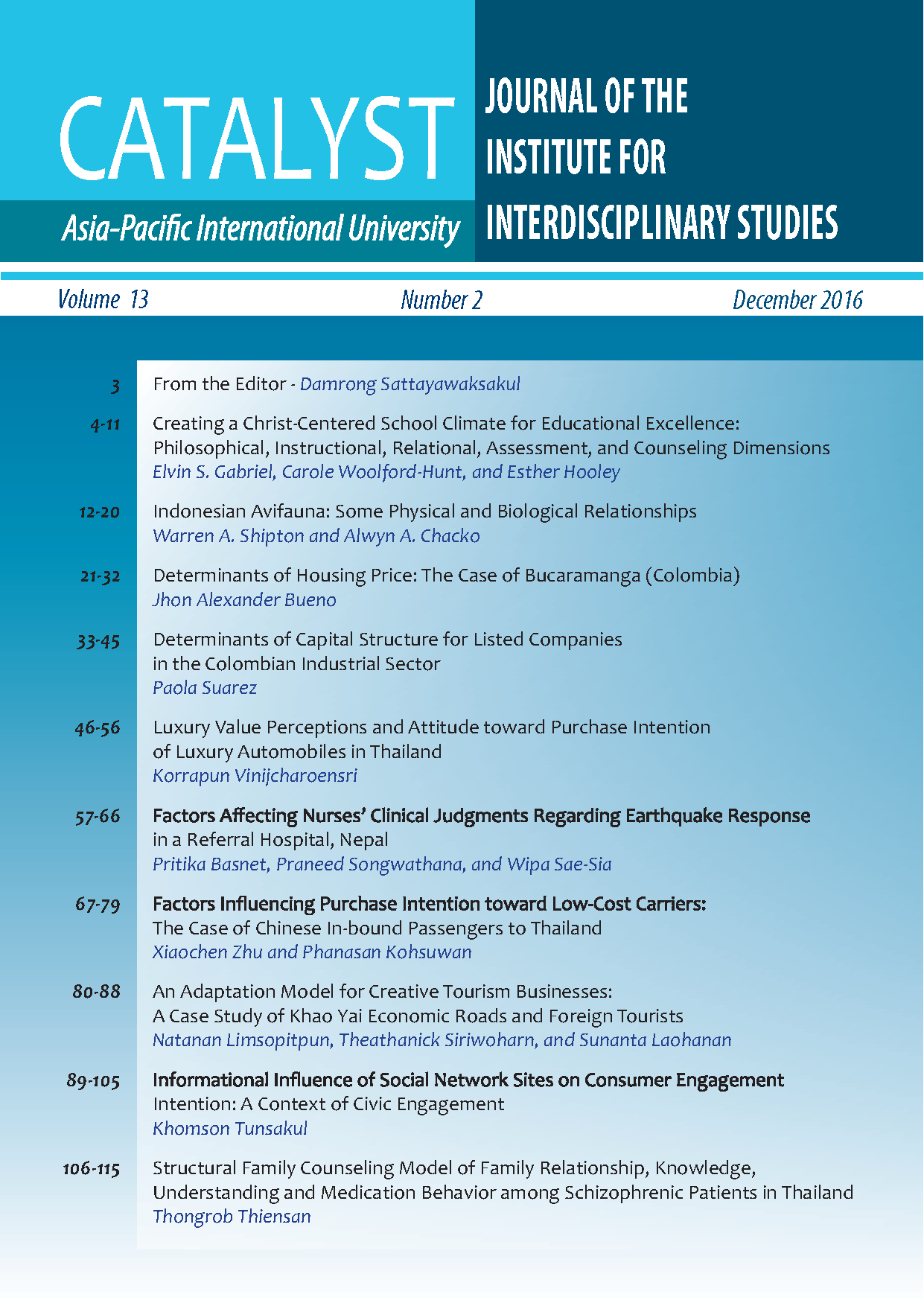Creating a Christ-Centered School Climate for Educational Excellence: Philosophical, Instructional, Relational, Assessment, and Counseling Dimensions
Main Article Content
Abstract
Interest is peaking among educators in North America, and around the world, on issues relating to school climate. A primary reason for this strong interest is research confirmation that school climate may have a positive or negative effect on educational processes. A Christ-Centered school climate provides the best opportunities for stakeholders to work collaboratively to achieve four primary educational outcomes. These are: (1) creating and sustaining bias free learning environments where relationships are nurtured by love, respect, tolerance, and kindness; (2) establishing faith-based instructional and service learning programs which cater to the needs of students; and (3) utilizing quality assessment tools to measure school climate, and instructional goals/objectives. This is a monumental task, but it can be accomplished if stakeholders are deeply and passionately committed to the foundational tenets of Christian education.
Article Details

This work is licensed under a Creative Commons Attribution-NonCommercial-NoDerivatives 4.0 International License.
Copyright: Asia-Pacific International University reserve exclusive rights to publish, reproduce and distribute the manuscript and all contents therein.
References
Cohen, J. (2006). Social, emotional, ethical and academic education: Creating a climate for learning, participation in democracy, and well-being. Harvard Educational Review, 76 (2), 212.
Cohen, J., Pickeral, T., & McCloskey (2008). The challenge of assessing school climate. Educational Leadership, 66(4). Retrieved from leadership/dec08/vol66/num04/The-Challenge-of-Assessing-SchoolClimate.aspx
Epstein, J. (2002). School family, and community partnerships: Your handbook for action. Corwin Press.
Gootman, M.E. (2008). The caring teacher’s guide to discipline: Helping students learn self-control, responsibility and respect, K-6. Corwin Press.
Hiatt-Michael, D.B. (2001). Schools as learning communities: A vision for organic school reform. The School Community Journal, 2(2), 113.
Hoge, D. R., Smit, E. K., & Hanson, S.L. (1990). School experiences predicting changes in self-esteem of sixth and seventh-grade students. Journal of Educational Psychology, 82 (1), 117-127.
Iowa School Boards Foundation (2007). Family, school and community connections: Improving student learning. Information Briefing, 1(6), 2.
Kuperminic, G. P. Leadbeater, B. J., Emmons, C., & Blatt, S. J. (1997). Perceived school climate and difficulties in the social adjustment of middle-school students. Applied Developmental Science, 1(2), 76-88.
Loukas, A. (2007). What is school climate? Leadership Compass, 5(1), 1.
Mastro, E. & Jalloh, M.G. (2005). Enhancing service through effective school/community collaboration. Practice Matters. ACT for Youth Upstate Center of Excellence, p. 1
Matthews, L., & Gabriel, E. (2001). Dimensions of the integration of faith and learning: An interactionist perspective. Journal of Research on Christian Education, 10(1), 34.
Perry, A. (1908). The management of a city school. New York, NY: Macmillan.
Seventh-day Adventist Philosophy of Education (Policy FE05, FE10). General Conference Policy Manual, 2005.
Slavin, R. E. (2012). Educational psychology: Theory and practice. Boston MA: Pearson Education Ltd.
Sullivan, S., Pynew, J. M., Cheney, A. M., Hunt, J., Haynes, T. F., & Sullivan, G. (2014). The pew versus the couch: relationship between mental health and faith communities and lessons learned from a VA/clergy partnership project. Journal of Religion and Health, 53, 1267-1282.
Tableman, B. & Herron, A. (2004). School climate and learning. Best Practice Briefs, 31, 3-4.
Thapa, A., Cohen, J., Higgins-D’Alessandro A., & Guffey, S. (2012). School climate research summary: August 2012. National School Climate Center, School Climate Brief, 3. Retrieved from https://www.schoolclimate.org/climate/documents/policy/sc-brief-v3.pdf
Thompson II, A. C. (2007, August 3). A philosophy of education. Retrieved from http://www.acthompson.net/PhilEd.htm.
Wang, M.C., Haertal, G. D., & Walberg, H. J. (1993). Toward a knowledge base for school learning. Review of Educational Research, 63(3), 249-294.
White, E. G. (1903). Education. Mountain View, California: Pacific Press Publishing Association.


